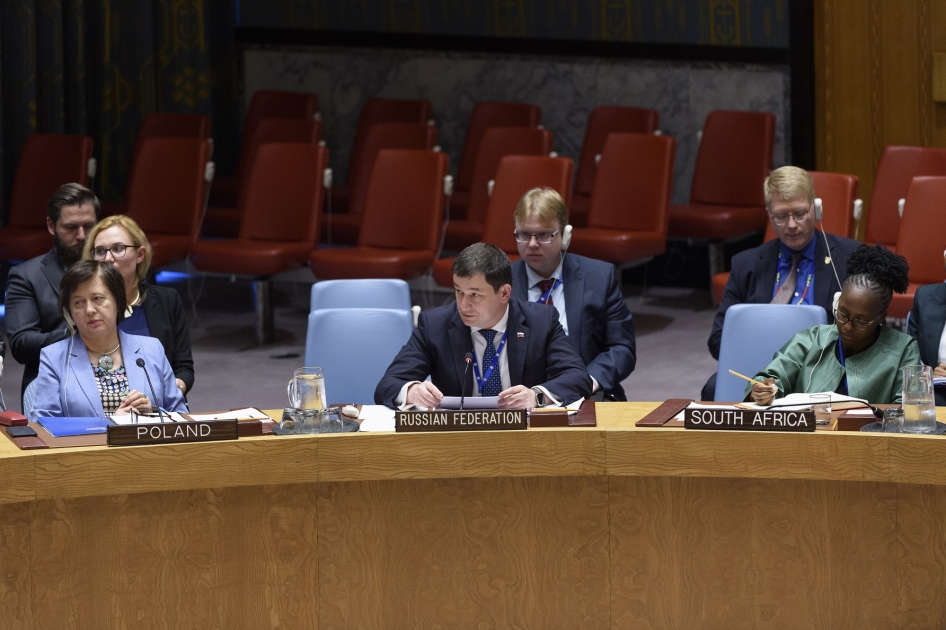Statement by Acting Permanent Representative Dmitry Polyanskiy at the Security Council meeting on Central Africa
Mr.President,
At the outset, let me thank our Indonesian colleagues for active and fruitful work in May and congratulate you on assuming Presidency of the Security Council. I wish to you every success and hope you will be having a relatively calm, I mean politically, month of Presidency.
We are thankful to Special Representative of the Secretary-General François Louncény Fall for his assessments of the state of affairs in the Central African subregion. Russia supports activities of the UN Regional Office for Central Africa (UNOCA) as it is an important tool of preventive diplomacy.
We share the views that the challenges existing for the countries of this subregion are of a complex nature. In this context it is vital that the regionals should “play the first fiddle” in terms of preventing crisis phenomena and settling conflicts. On our part, we stand ready to provide support for such efforts.
Mr.President,
We believe the Central African region is key from the point of view of preventing the spread of terrorism in the entire continent. Radical and terrorist elements penetrate the Central Africa, which goes together with illegal traffic in arms, drugs and flow of revenues from exploitation of mineral resources.
We give a positive assessment to the regional efforts to develop coordinated approaches towards countering all manifestations of terrorism. Regional multinational armed forces constitute a good example of such efforts. It is vital that they be adequately funded so that States from the Lake Chad basin could continue joint operations to chase and neutralize militants in trans-border areas.
Given support of the international community, progress was achieved in countering “Boko Haram”. However, the group is still capable of carrying out high profile outings. “Boko Haram” does not abandon its activities in Chad, including in areas adjacent to borders with Niger, Nigeria, Cameroon, where extremists attack local population, UN officials, representatives of NGOs, Chad military outposts. We are seriously concerned by the influx of foreign recruits to “Boko Haram”, some of them coming from the IS. Reportedly, in 2018 “Boko Haram” replenished its ranks by approximately 2,000 recruits.
We stand ready to continue energetic work in various formats in the interests of eradicating terrorist threat on the African continent. We pay specific attention to tracking sources of terrorists’ financing and their contacts with other international radical groups.
Mr. President,
Russia closely monitors the developments in the Central African Republic. We support efforts of President F-A.Touadera aimed at an inclusive political dialogue, prompt reform of the security sector and increasing capacity of the armed forces. The Political Agreement for Peace and Reconciliation in the Central African Republic dated 6 February is an important starting point for further settlement of the situation in the country. On our part, we will continue to follow-up on this process of national reconciliation and coordinate our efforts with everyone who is engaged in search for ways to normalize the situation without pursuing any “hidden agenda”.
Piracy in the Gulf of Guinea is another instability factor in the Central African region. Unfortunately, there are ongoing attacks on foreign ships, whereby i.a. Russian mariners are taken hostage.
My country has a positive experience of participation in international efforts to combat piracy in the North-West of the Indian Ocean, in the framework of a Contact Group on Piracy off the coast of Somalia. We hope this know-how might be used to solve similar tasks in the Gulf of Guinea, including in the context of expanding the geographical mandate of the contact group to the Gulf of Guinea as well.
We are concerned by unstopping activities of the “Lord's Resistance Army”. Thanks to the efforts of the regional armed forces, it has been marginalized in the recent years. However, it still undertakes looting and robberies in some areas of the CAR and the DRC. States of the Central Africa should not shift focus of their attention from combatting this group. We hope the ECCAS concept of curbing this threat will yield fruit.
Mr. President,
We follow the developments in Cameroon. It was not yesterday that there emerged a problem of Anglophone provinces. Division of former colonies without due account for religious, linguistic and ethnical differences planted numerous hotbeds of tension in the entire Africa, Cameroon being no exception.
We call upon all sides in Cameroon to stay reserved. Solution to the domestic problems in Cameroon can only be found at the negotiation table during a substantive national dialogue, given compliance with the rule of law and observing of human rights.
Mr. President,
In conclusion, let me remind that threats and challenges that the region of Central Africa is facing now are closely interconnected and the States of the region are interdependent. Destabilization in one country is able to disturb the entire region and collapse neighbors’ security. Therefore, it is crucial not to cross the line and not let prevention turn into interference in the internal affairs.
Thank you.
